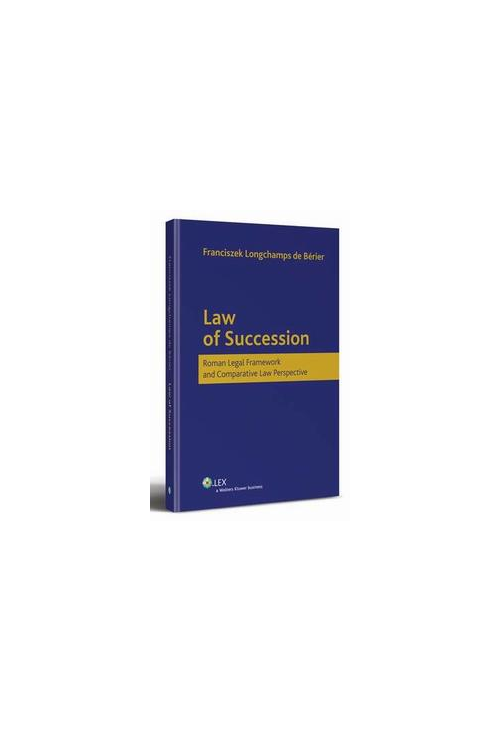
- -11%
ebook Law of Succession. Roman Legal Framework and Comparative Law Perspective
Zanurz się w fascynującym świecie prawa rzymskiego i jego wpływu na współczesne regulacje dziedziczenia z "Law of Succession. Roman Legal Framework and Comparative Law Perspective" autorstwa Franciszka Longchamps De Bérier, wydanego przez Wolters Kluwer w 2011 roku. Ta wyczerpująca analiza odkrywa bogactwo i złożoność rzymskiego prawa spadkowego, które nadal stanowi fundament dla wielu systemów prawnych na świecie.
Poznaj kluczowe koncepcje:
- Rola porównawcza prawa rzymskiego w rozwoju nowoczesnych regulacji dziedziczenia
- Wpływ rzymskich dogmatów i mechanizmów na współczesne prawo
- Znaczenie języka prawa rzymskiego jako uniwersalnego narzędzia do opisywania zagadnień dziedziczenia
- Dyskusje o reformach i budowaniu regulacji dziedziczenia w poszczególnych krajach
- Potencjał prawa rzymskiego dla debaty nad unifikacją prawa spadkowego w Europie
Odkryj:
- Jak doświadczenie prawa porównawczego i rzymskiego rozszerza nasze zrozumienie współczesnych regulacji dziedziczenia
- Jak głęboka analiza, uwzględniająca cele, wartości i zasady prawa, prowadzi do docenienia wartości prawa rzymskiego
- Jak bogactwo koncepcji i dogmatów rzymskiego prawa spadkowego tworzy podstawę dla dyskusji o dziedziczeniu niezależnie od tradycji prawnych
Czy jesteś gotowy na głębokie zanurzenie w fascynującym świecie prawa rzymskiego i jego współczesnych zastosowań? Pobierz teraz ebook "Law of Succession" w formacie PDF, który możesz łatwo otworzyć na dowolnym urządzeniu. Ciesz się dostępem do najlepszych ebooków literatury prawniczej i poszerz swoją wiedzę z Wolters Kluwer.
Kup e-booka już dziś!
Spis treści ebooka Law of Succession. Roman Legal Framework and Comparative Law Perspective
INTRODUCTIONstr. 9
PART I
THE LAW
str. 21
CHAPTER 1
General notions
str. 23
§ 1. Law of succession and other branches of private law
str. 23
§ 2. Means of protection under the law of succession
str. 26
1. Hereditatis petitio
str. 27
2. Quorum bonorum interdictum
str. 34
3. Cognitiones extra ordinem
str. 38
§ 3. Individuals and succession
str. 40
1. Testamenti factio activa
str. 41
2. Testamenti factio passiva
str. 44
3. Capacitas
str. 48
4. Indignitas
str. 49
CHAPTER 2
Values and principles of the Roman law of succession
str. 52
§ 4. Values of the law of succession
str. 53
§ 5. Principles of the law of succession
str. 54
1. Nemo pro parte testatus, pro parte intestatus decedere potest
str. 54
2. Freedom of testation
str. 58
3. Principle of family solidarity
str. 65
4. Respect for a dead person',s wishes
str. 78
5. Semel heres semper heres
str. 80
6. Nasciturus pro iam nato habetur quotiens de commodis eius agitur
str. 83
CHAPTER 3
Intestate succession
str. 88
§ 6. Order of succession in civil law
str. 89
§ 7. Order of succession in praetorian law
str. 95
§ 8. Order of succession in Justinian',s Novels
str. 102
§ 9. Applying the Roman law framework in intestate succession
str. 109
CHAPTER 4
After the death of the de cuius
str. 113
§ 10. Succession against the will
str. 113
§ 11. From entitlement to succession
str. 123
1. The various groups of individuals
str. 123
2. Death of the testator vs. acquisition of the inheritance
str. 125
3. Transmission
str. 127
4. Accruals
str. 130
§ 12. Acquisition of the inheritance
str. 133
1. Acquisition of the inheritance ipso iure
str. 133
2. Modes of accepting the succession
str. 135
§ 13. Issues infl uencing decisions about inheritance
str. 138
1. Usucaption
str. 138
2. Liability for the debts of the deceased
str. 139
3. Benefi t of inventory
str. 142
4. Protection of creditors
str. 145
5. Inheritance tax
str. 146
PART II
THE TESTATOR
str. 149
CHAPTER 5
External formalities pertaining to the will
str. 151
§ 14. Archaic law - the calatis comitiis will and the in procinctu will
str. 152
§ 15. From mancipatio familiae to the mancipatory will
str. 153
§ 16. The praetorian will
str. 158
§ 17. Later forms of wills
str. 163
§ 18. Emergency wills and special cases
str. 168
§ 19. Military wills
str. 170
CHAPTER 6
Contents of the will
str. 176
§ 20. Appointment of the successor
str. 176
1. Instituting an heir
str. 176
2. Heirs by substitution
str. 183
§ 21. Disinherison - exheredatio
str. 190
§ 22. Gifts out of the inheritance
str. 193
1. Legacies
str. 193
2. Fideicommissa
str. 203
§ 23. Other testamentary decisions
str. 210
1. Manumissions
str. 210
2. Appointment of a guardian
str. 211
3. Instructions
str. 212
§ 24. Dispositions not necessarily made in the will
str. 215
1. Codicillary clauses and codicils
str. 215
2. Deathbed gifts
str. 220
CHAPTER 7
Interpretation of wills
str. 228
§ 25. The testator',s intentions vs. the form and contents of the will
str. 228
§ 26. Favor testamenti
str. 231
ABBREVIATIONS
str. 249
INDEX OF SOURCES
str. 253
Szczegóły ebooka Law of Succession. Roman Legal Framework and Comparative Law Perspective
- Wydawca:
- Wolters Kluwer
- Rok wydania:
- 2011
- Typ publikacji:
- Ebook
- Język:
- polski
- Format:
- Liczba stron:
- 292
- ISBN dla wersji papierowej:
- 9788326414688
Recenzje ebooka Law of Succession. Roman Legal Framework and Comparative Law Perspective
-
Reviews (0)

Na jakich urządzeniach mogę czytać ebooki?
- -11%





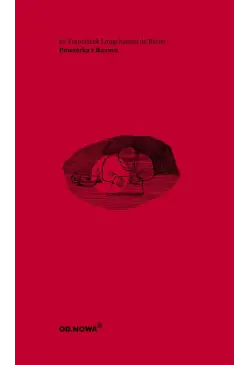

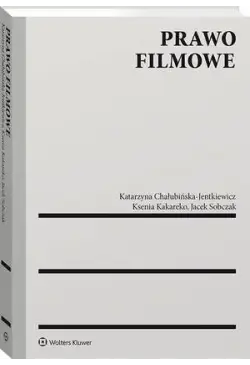
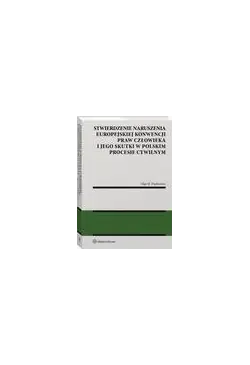



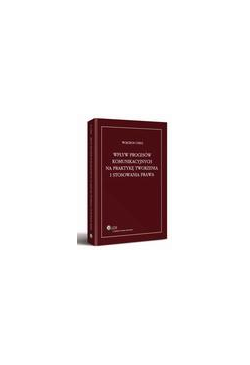

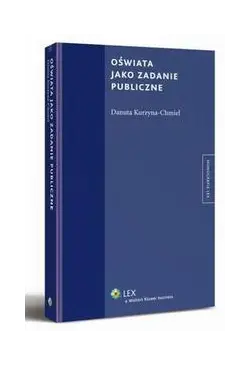
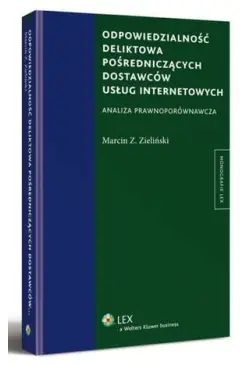


@CUSTOMER_NAME@
@COMMENT_TITLE@
@COMMENT_COMMENT@